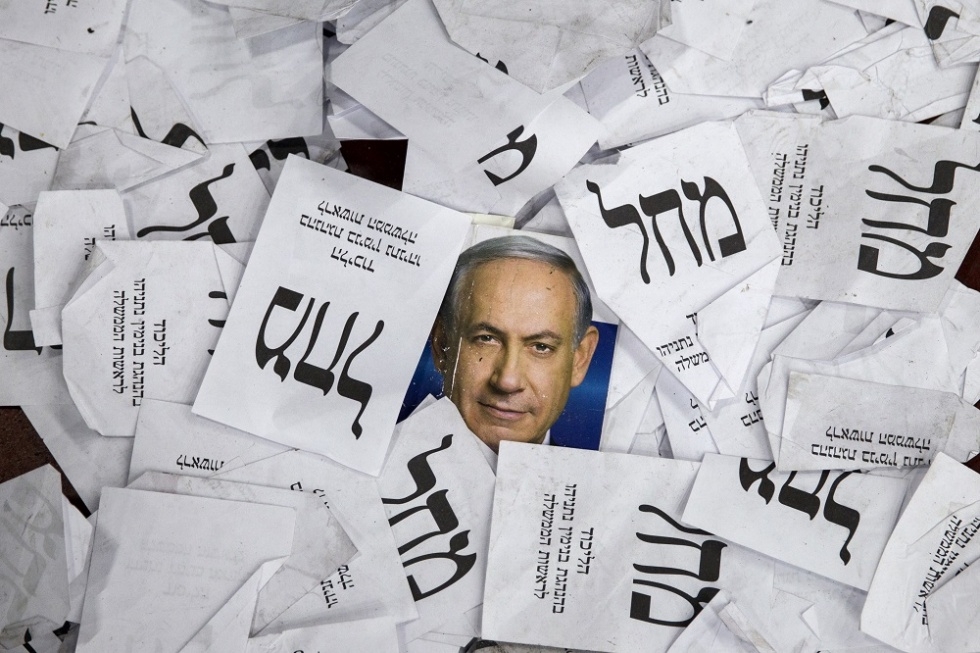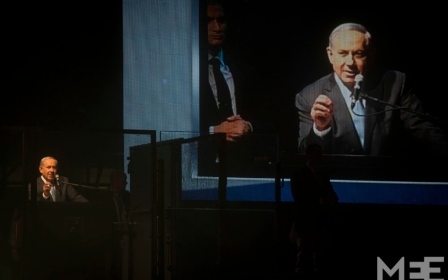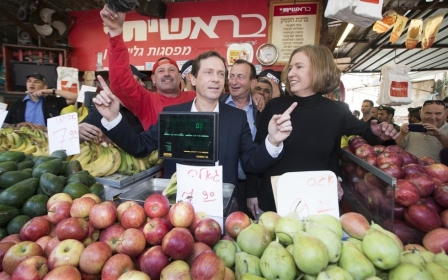Netanyahu win greeted with mixed reactions in Israel

ISRAEL - It was an election that saw him slammed as a panicked statesman, an anti-democratic racist and a leader who, for the sake of Israel, simply had to go.
But as the last votes were counted for the Israeli election on Wednesday morning, it became clear that Likud’s Benjamin Netanyahu would be the man to lead the next Knesset, leading with 30 votes to the Zionist Union’s 24. He secured about 25 percent of the vote.
As Prime Minister, he’ll be on course to surpass David Ben Gurion as the longest-serving holder of the post in Israel’s history.
“I am proud of the Israeli people, who recognised what's important,” Netanyahu told crowds in what was dubbed a victory speech just a few hours after the first counts emerged.
"Now we must form a strong and stable government that will care for the security and welfare of all of Israel's citizens.”
In Jerusalem, where Netanyahu’s face stared glossily out from countless banners, with street teams of 17-year-old girls slapping Likud stickers on passers-by on election day, the mood was tinged with relief.
Although many right-wing supporters - particularly those that supported Jewish Home’s Naftali Bennett – said they were disappointed that their old and now new Prime Minister was “too left-wing,” many were optimistic that a government headed by Netanyahu would be able to deliver over the next few years.
‘He's the best one we have’
“I think it will be good. He's the best one we have,” Gal Manzor, a 37-year-old from Ramat Gan, said.
“I believe in all the situations with the Palestinians we can get the best deal.”
Although the PM confirmed during the election that he was opposed to a two-state solution, Manzor said that he believed him to still be behind the idea of a settlement based on the two-state idea.
“I believe Netanyahu can make peace. With a strong person, I believe we can make peace.” he said.
Manzor friend Asi, however, who would only give his first name said he was disappointed.
“I’m more interested in peace than him,” he said. “I wished for a change in the atmosphere, to get rid of Bibi.”
Anti-Likud sentiment - often expressed more strongly than Asi articulated – has meant that the lack of leadership change has dominated the headlines since the results started to trickle in.
Up until the last minute, pollsters rated Netanyahu as far less popular than he proved to be, instead predicting that he was on course to lose to the left.
Eric Mordechai, 64, from Tel Aviv, cast his vote for ex-Likud Kulanu head Moshe Kahlon, and said he didn’t care who was the Prime Minister as long as his favourite candidate had a seat. Speaking to Middle East Eye from West Jerusalem’s grubby bus station, he explained why he believed Netanyahu had fooled the pollsters.
“The problem is with the media. All the media is against Bibi, the Prime Minister, and the people don't like it,” Mordechai said.
“All the time, the media are against the government. But who is the government? The people are the government! Now they’re saying to the media: 'F**k You'. I've been hearing it on the street all month. The people are taking action against the media.”
View from Tel Aviv
For the Zionist Union - a centre and centre-left effort from Labor leader Isaac Herzog and former Justice Minister Tzipi Livni - the results are likely to be bitterly disappointing.
While the Zionist Union is now the second-largest force in the Knesset, polls in the run up to the vote had the Herzog-Livni ticket up by as much as four seats.
Zionist Union leadership announced on Wednesday that they would most likely serve in opposition to a Netanyahu-led government rather than in a grand coalition as some analysts had suggested. This likely means that Herzog-Livni will continue to work together in some fashion.
The pair campaigned largely on the premise that anyone was better than Bibi – a nickname for the prime minister - and expressed confidence for their victory: in Tel Aviv’s bohemian Florentine district, 28-year-old Zionist Union supporter Jane Zohr and her friend Mark King, a bartender, were unhappy but not surprised.
“I didn’t vote, because look what happens when you vote, you just get disappointed,” King told Middle East Eye. “The people love Bibi. They love the right wing. And when he brought out all that right-wing stuff at the last minute, people loved that.”
Netanyahu stirred controversy on election day, by issuing statements alleging that large numbers of Palestinian Citizens of Israel were heading to the polls, in a move clearly intended to stir up the base.
Zohr, who voted for the Zionist Union, jokingly said she planned to leave the country the next day. “Bibi sucks. Israel is getting worse and worse,” she said. “Maybe things were good when [former Labor Prime Minister Yitzhak] Rabin was in government, but since he was killed [by a far-right gunman in 1992] things have just become more and more of a mess.”
A stone’s throw away from the comfortable Tel Aviv lifestyle that’s often mocked by right-wingers, Gideon, a 27-year-old refugee from Eritrea also said he has reason to be unhappy with the result. While he has lived in Israel for three-and-a-half years, he is one of 35,000 Eritrean refugees who have precarious legal status in Israel and have little to no chance of becoming citizens or having their status normalised.
“I don’t feel good about it. Netanyahu doesn’t respect democracy and he doesn’t respect us as refugees,” said Gideon who did not want to give his last name in case it impacted on his application. “He doesn’t respect the 1951 proclamation [Convention relating to the Status of Refugees]. He just thinks of us as these people from Africa, and he talks about sending us back.”
While the Convention was ratified by Israel, it has not been adopted into national law.
Joint List
Although the big story of today has been the Likud win, another group have enjoyed historic successes at the polls.
A combined slate of several Arab-Israeli parties, as well as the Communist Party, known as the Joint List was created after the electoral threshold was raised, threatening to drive Palestinian representation out of the Knesset altogether.
Instead, turnout among Palestinian citizens of Israel soared, and with 14 seats it’s now comfortably the third biggest party in the Knesset, which means it could be an influential force in politics.
At the Nazareth headquarters of the Arab Joint List, representatives and allies stressed that there was much to be optimistic about. Wael Omri, a 52-year-old supporter of the list, expressed his excitement at the List’s Nazareth headquarters.
“I think it's a historic event. It's the first time the Arabs come together,” he told Middle East Eye on Tuesday night. “We've never seen this before: a point when all the world and Israel sees that Arabs here a big power, that we can have our rights. We want to see a government in Israel that says yes to our rights.”
More than an hour after the results were announced, an atmosphere of enthusiasm, was palpable at the headquarters with a Palestinian flag raised and lots of young supporters singing and dancing. But even amidst the celebrations, supporters were careful to be both realistic, and optimistic.
“We reached our goals. We are the third biggest party,” Ayman Odeh, the List’s leader, told the assembled crowds. “We will prevent the right wing from creating the next government. The joint list is a success story. We are at the heart of a historical event.”
Odeh’s optimism, however, was not universally felt: for Palestinians, the fact that Netanyahu remains in power is an unhappy, and revealing, reality. The Prime Minister achieved his victory on the back of an announcement that he would stand against a Palestinian state, and an inflammatory last minute “warning” that Arabs - citizens of Israel with the full right to a democratic voice - were voting “in droves”.
“We were hoping for more. We expected more,” Majd Karam, who works for an Arabic-language news organisation, told Middle East Eye as the results began to come in. “Bibi will be the next PM as usual and nothing will change. It was obvious.”
In the streets of Nazareth after the election results had become clear, many residents likewise seemed more ambivalent than excited. For some, disinterest was the only relevant political opinion, defined by the belief that Israeli politics was of no relevance to their lives and that both camps were almost as bad as each other.
“I don't think there'll be any change. It'll be the same as before,” Osama Taha, who runs a shop in Nazareth’s old city, said. “I voted, of course, and I'll continue to vote, but the Arab list won't be able to do much.”
Among the Joint List’s Tel Aviv supporters there was also heavy disappointment in the results, even if some tried to keep a sense of optimism. Heela Harel, 41, said she and many of her friends had voted for the Joint list, in the hope that it, and other new political movements, could make a change in politics.
"There was a hope things could turn out different," she said. "What surprises me is that after six years people still believe him. After the last two wars, people's memories really amaze me. I guess people are willing to accept it now - this is what they see as normal, as inevitable.”
"I don't see it getting much worse,” she continued. “I try and think of it as a window for a bigger change. Hopefully after this result the people that think differently will get up and do something, realise they need to act.”
New MEE newsletter: Jerusalem Dispatch
Sign up to get the latest insights and analysis on Israel-Palestine, alongside Turkey Unpacked and other MEE newsletters
Middle East Eye delivers independent and unrivalled coverage and analysis of the Middle East, North Africa and beyond. To learn more about republishing this content and the associated fees, please fill out this form. More about MEE can be found here.




